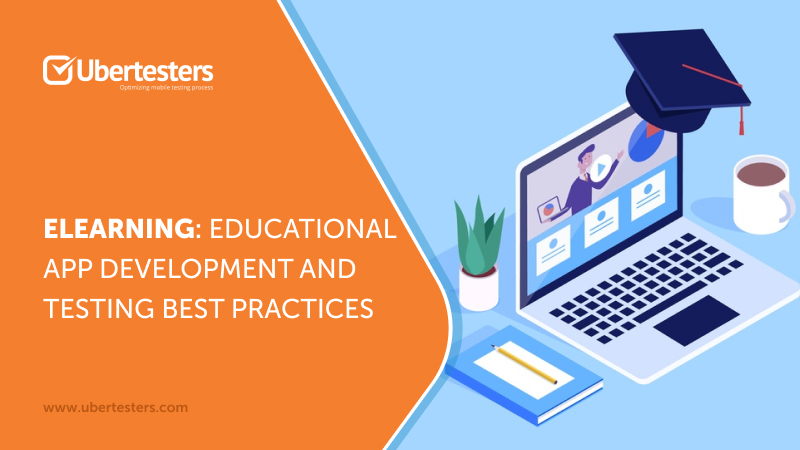eLearning: Educational App Development and Testing Best Practices

Online learning continues to gain amazing popularity. eLearning mobile apps are becoming even more demanding due to the global COVID-19 crisis. This means that the number of active users of virtual classrooms and learning apps will continue to grow. Therefore, many companies are now focused on eLearning app development and are looking for the most effective mobile app testing best practices. In this post, you will find the basic info about eLearning app development, as well as the best hints on how to test an education app in the most effective way.
Online Learning Business Model: The Basic Facts
How to set up an e-learning portal? Creating an online education app requires a deep understanding of the main principles of eLearning. Generally, it is a kind of distance learning that is available to all the users regardless of their location. This means users can enjoy self-education with the help of modern technologies. eLearning usually includes various online education platforms, mobile apps, tools, videos, and programs. As a rule, this type of learning is suitable for beginners and doesn’t require any special development skills or knowledge. Traditionally, online education applications are easy-to-use and understandable.
eLearning has a whopping number of advantages:
- Flexibility – users can use the platform using different devices
- Mobility – learners can learn anytime and everywhere
- Accessibility – students have easy and convenient access to different types of information
- Individual approach – learners can have their own schedule and can spend as much time as they need for self-education
- High efficiency – students are able to study at their own pace
- Low costs – online services are much cheaper than studying at college or visiting physical courses
Types of eLearning solutions

There are plenty of apps and services that offer online education. Moreover, the market continues to grow. Here is a list of the most common types of eLearning applications you need to know.
Online courses
These types of eLearning solutions remain popular for years. The brightest examples of this service are Coursera, Khan Academy, Udemy, and Open University. All of these platforms cover dozens of fields of study and contain thousands of courses on various topics. These are usually ‘asynchronous eLearning’ (students perform self-paced online training).
Business eLearning courses
Business eLearning courses are often offered by big and middle-sized companies to their employees. The number of types of courses is really amazing – starting from short in-house training courses to long-term ones, including trade, insurance, and other niches. These courses are designed to help internal employees improve their qualifications and gain some job-specific skills.
Applications to improve memory
As a rule, these are very entertaining and user-friendly apps that are designed to help you remember various types of information. You can use flashcards, quizzes, and solve various online tasks to boost your memorizing abilities.
Apps to learn foreign languages
These applications are designed for those who want to improve their language skills. Using these types of apps allows you to increase your vocabulary, learn grammar, and start speaking any foreign language fluently.
Extra educational tools
There is also a wide range of apps that offer supplementary services to your online education. For example, you can freely use different online dictionaries when learning foreign languages or stick to online libraries when completing your academic assignment.
Creating different types of eLearning products or services requires using various approaches and development phases. For example, iOS app development has lots of differences from creating an application for Android. However, mobile app testing of online education solutions is a solid and well-structured process followed by most QA professionals.
eLearning Application Testing Checklist

Testing mobile applications is an inevitable part of developing e-learning solutions. Moreover, it is not as easy as it might seem from first glance. You can hardly find sample test cases for mobile applications in the field of eLearning. Therefore, testing each eLearning app requires an individual approach. There are lots of reasons why mobile apps fail and you need to eliminate all those risks by implementing an advanced quality assurance process.
QA professionals believe that the process of testing might be easier in case the testing team follows these simple tips:
Find experienced testers
There are plenty of companies that don’t have an in-house team of testers. This way, it is necessary to find skilled professionals who will perform the entire QA process in a fast, flexible, and effective way. Furthermore, most eLearning apps require a touch-screen approach to selected classes and exams, therefore you must use testers with real devices and not simulators testing solutions. Crowd Testers might become an excellent alternative for performing the QA tests in a fast, productive, and cost-effective way.
Find unique ways for eLearning application testing
It is necessary to find particular testing methods that will perfectly suit your app. The QA professionals will need to “wear the shoes” of the app’s users to find all the vulnerabilities, bugs, and imperfections of the eLearning service. Moreover, in case your solution is designed for students from different countries, it is necessary to test your application on various multi-devices, carriers, and locations. All the learners should have flawless access to your app. Testing on mobile devices is an obligatory step of almost any QA process.
Testing the ‘Role of the user’
To ensure your eLearning platform is perfect, you need to assign testers with different roles. These testers should test the platform and the app based on their specific role to make sure there are no flaws with it. Each eLearning platform might have specific roles, however, the basic roles to test should be:
1) ‘The student’
2) ‘The instructor’
3) The ‘Course administrator’
4) The platform’s ‘commercial manager’.
By using global crowd testers, creating specific test cases based on what these roles require to test – one can have a comprehensive view and make sure that all roles perform perfectly without any flaw.
Types of tests you need to use during the QA process

The process of testing requires checking tons of various parameters. Discover the basic types of tests that you need to perform to make sure your eLearning app is a top-quality solution.
Functional testing
Functional testing is a must for any QA procedure. The fact is that all the app’s features should be carefully checked by a crowd of testing experts. This way, you will make sure your app works properly. These are the most common aspects to be checked during the QA process:
- Screen size and orientation
- Responsiveness
- User interface
Performance testing
QA professionals will need to test the app in real conditions and try various scenarios of using the service. There are plenty of parameters that need to be checked during performance testing. These are testing various graphical elements, using different modes of the app, as well as load and stress testing. For example, is the app battery-friendly? What is its level of battery consumption? Performance testing will provide you with answers to all these questions.
Usability testing
How easy-to-use your application is? Is it comprehensive? Will a common user understand how to use the app’s basic functions? The results of usability testing will give you the answers to all these questions.
Localization testing
Is your app designed for students from different countries? What about choosing a correct date and time, numbers, currencies, and other specific location-related parameters of an eLearning solution? OF course, all these aspects should be checked, too.
Security testing
It is vital to make sure the app has no vulnerabilities or any security bugs. For example, in case you offer students some paid courses, it is necessary to double-check whether the process of payment is 100% secure.
Conclusion
There are many eLearning apps out there, and if you are not testing your solution on a regular basis, you are likely to have bugs, crashes, or simply issues with the flow. By having such bugs you are likely to lose students to your competition. Use ongoing global QA testing to find ways to improve the online experience of your online students and by that – improve the product, the user experience, and, as a result, remain competitive and successful.
All in all, testing an eLearning app is a long and challenging process. Want to know more about testing your product, and launching a perfectly tested product – contact us at sales@ubertesters.com

